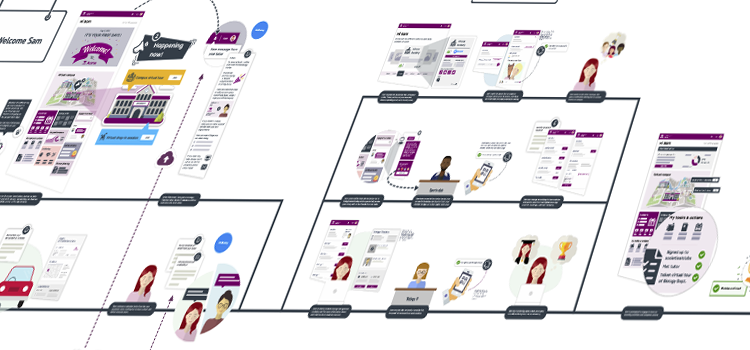Focus on Student Experience to Succeed in these Uncertain Times
The experts from PA Consulting discuss the importance of an omni-channel approach, and offer three priority areas for the new term.

It’s an uncertain year ahead
Clearly COVID-19 has turned things upside down.
Campuses have been shut down with a need to switch millions of students and thousands of staff to digital platforms, almost overnight.
And if the challenges of operating today and tomorrow weren’t bad enough, the uncertainty and complications of the new student year loom strongly. Will applicants want to start their courses while uncertainty presides? If they do start, will it be on campus, at home, or somewhere in between?
No one knows the answers.
But we do know we need to be prepared for any scenario and continued volatility.
Our poll at the AHUA “The Future of the Student Experience” webinar on 12 May 2020 showed the majority of attendees are responding to COVID-19, but are unsure of everything they need to do.
As we look ahead to the new academic year, a focus on a new student and staff experience is essential. To succeed, it must be:
- Omni-channel
- High in engagement
- Focussed on wellbeing
We have designed a target experience to bring that to life for an academic world impacted by COVID-19. We will focus on its key features below.
Delivering an omni-channel experience
When the new academic year starts, we don’t know if students will be on campus or not.
We need to ensure we can serve them on and/or offline, and allow them to switch seamlessly in-between, otherwise known as an omni-channel model.
This means enabling students to engage effectively and consistently through digital, voice, or face-or-face methods, either remotely or on-campus, as circumstances allow.
Critically, that experience must allow students to switch seamlessly between those channels. Creating digital and physical silos alongside one another should be avoided.
Of those at the AHUA webinar, 55% were planning an omni-channel experience. They can learn from retailers like John Lewis, whose shift from a physical retailer to an omni-channel retailer has been key to their continued ability to trade effectively under lockdown.
Three priority areas
Under that omni-channel experience, there are three key areas to focus on for the new term:
- On-boarding and engagement to build support between applicants and existing students.
- Wellbeing to support anxiety and challenges of uncertainty.
- Remote teaching to deliver your academic proposition.
We will explore these in detail below.
1. On-boarding and engagement
Proactive engagement is critical in times of uncertainty.
A digital onboarding service – planned by 65% of our webinar attendees – helps ensure clear communications and engagement with applicants and students. This builds a bond.
We’d expect this service to include:
- a countdown to becoming an undergraduate.
- a virtual campus to explore.
- guides on accommodation and finance.
- a buddy matching service creating vital connections.
- alerts on the implications of changing policies.
When the big day arrives, if they are still unable to come to campus, then welcome them with a fanfare. Deliver a virtual freshers fair and continue to exploit digital channels to make those all-important person-to-person connections.
2. Wellbeing
The current uncertainty brings anxiety and feelings of isolation, so it is critical that we support wellbeing throughout.
Wellbeing advice and access to support must be available at the fingertips of everyone. For example, advice could be offered through video content or a chatbot. Those who can offer support should be accessible through chat, voice, or video link. Simple mood checks can be incorporated into existing portals, and should be a prominent feature of any on-boarding service.
Interestingly, only 31% of webinar attendees are planning wellbeing services. The good news is there are many third party wellbeing apps already available which can provide a useful service for many organisations.
3. Remote-teaching
Many universities have had to switch rapidly from a physical to remote mode of learning. 73% of our webinar attendees have, or are planning, remote seminars and tutorials.
High quality digital content, and access to platforms that distribute it, are two common barriers.
Lecture notes and an email link are simply not good enough. Many universities are exploring new platforms, including augmented reality and virtual reality. However, only 6% of our webinar attendees were planning to do so.
Whatever you choose to do, ensure the content is engaging. The platform should foster collaboration. It shouldn’t be a one-way broadcast channel from university to student.
Ideas without delivery mean nothing
In order to deliver these changes, universities are adapting their delivery models to ensure they can bring new services into operation in weeks, not months.
Common actions include moving to agile delivery, with 84% of our webinar attendees planning to do so, and more collaborative delivery, which 72% of attendees were planning.
We believe that an omni-channel experience, together with these three priority focuses, are the key actions universities need to take to ensure they can continue to provide an excellent student experience.
These new services, along with compelling content, will be critical to creating the engagement and all-important bond between the university and students in these uncertain times. They will put you in the best possible place for a successful 2020/21 academic year.
Get in contact
We are happy to share our target student experience with you in more detail, as well as our experience helping other organisations, like John Lewis, shift to an omni-channel model, and rapidly deploy digital on-boarding and wellbeing services. Please get in touch with Rob Mettler, Natalie Taylor or Paul Woodgates, if you’d like to know more.
Rob Mettler and Natalie Taylor are digital business experts, and Paul Woodgates is head of higher education at PA Consulting, the global innovation and technology consultancy.
Related Blogs



